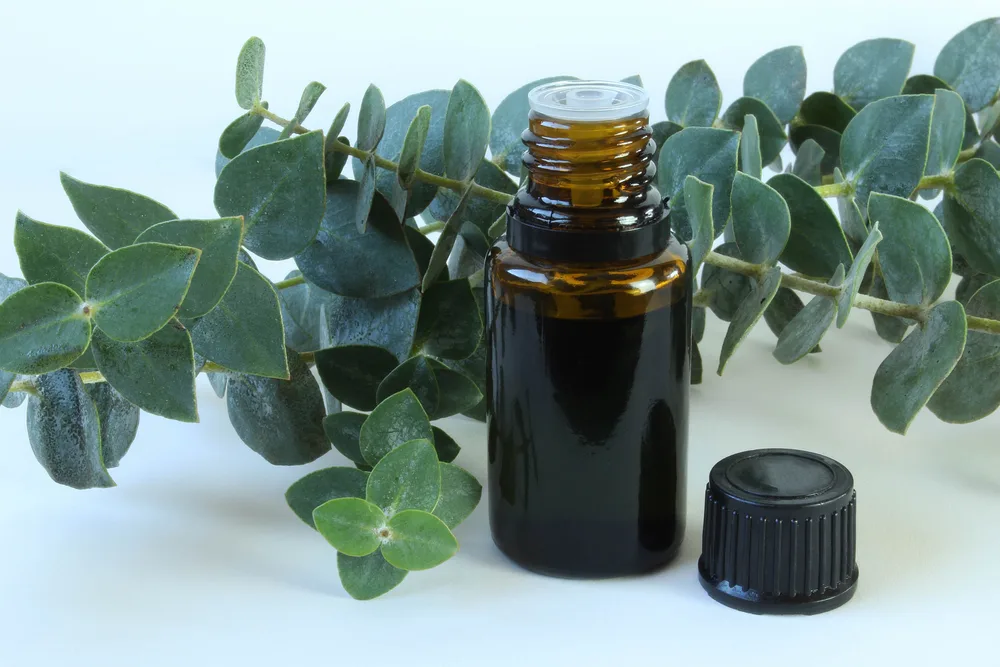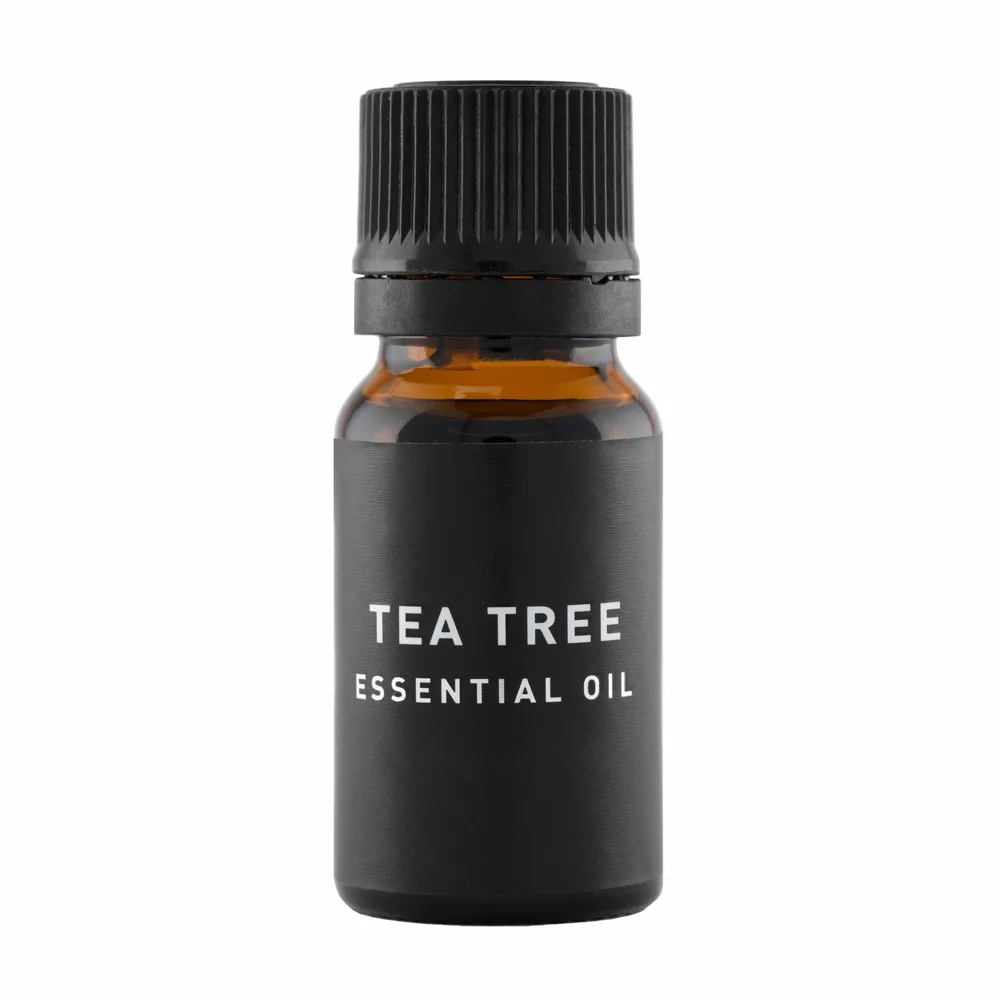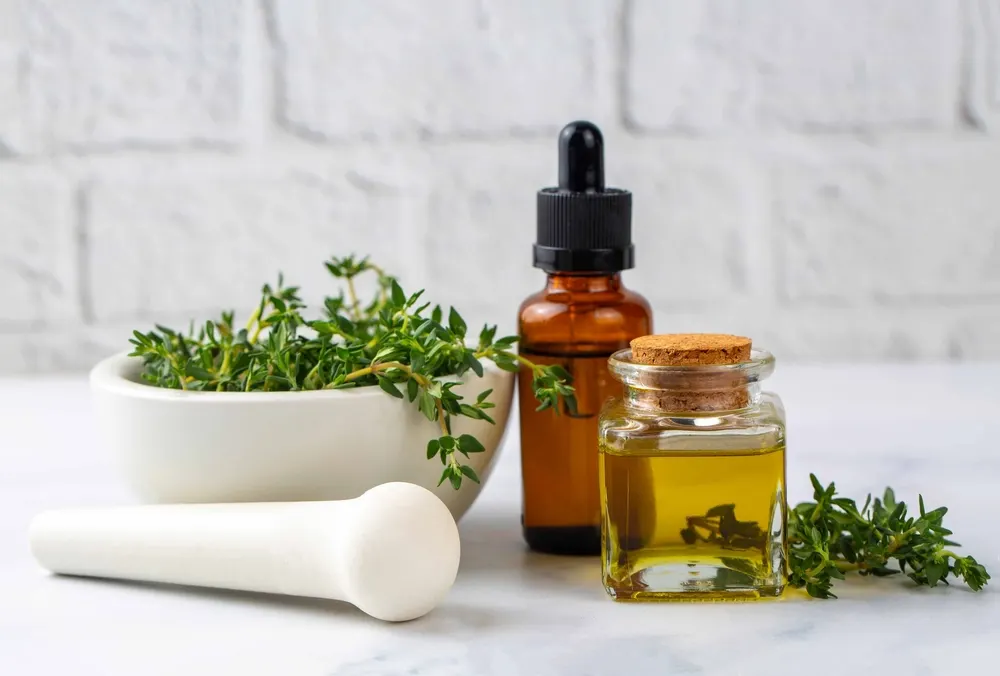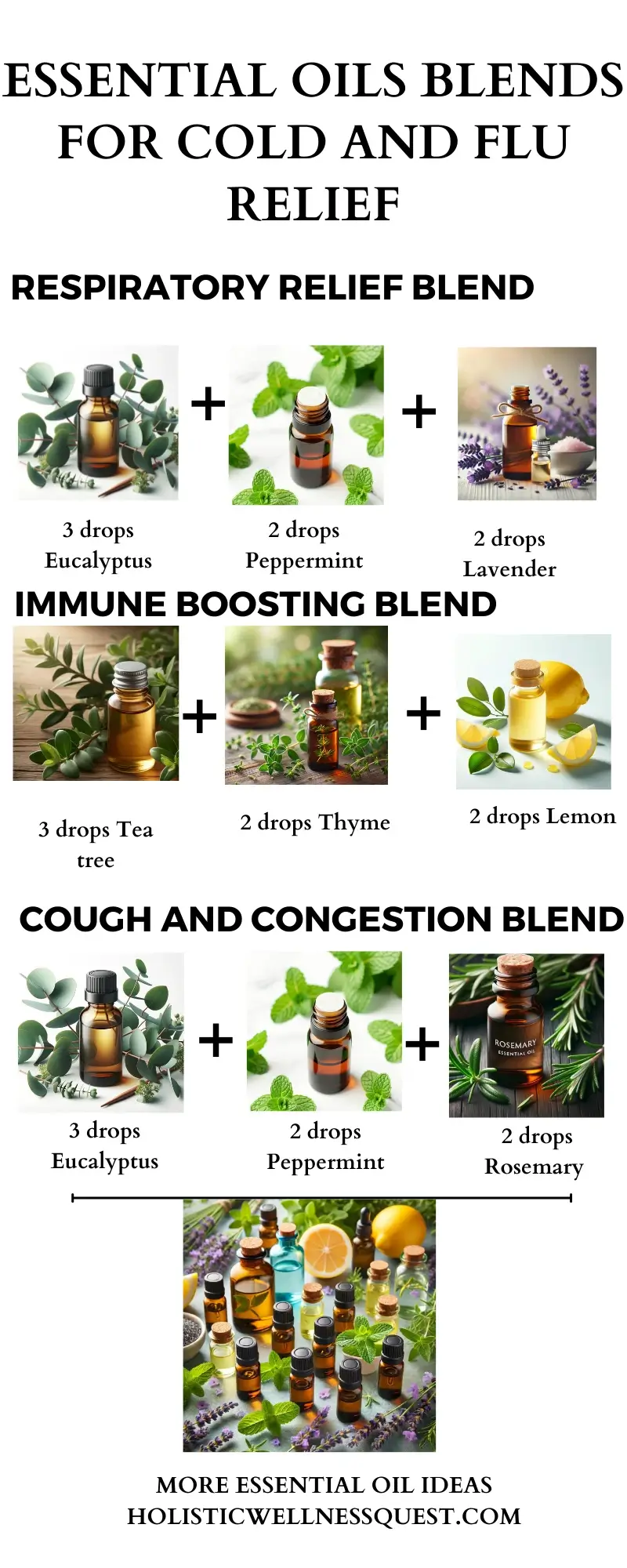Essential Oils for Cold and Flu

Feeling under the weather? It could be because of cold and flu.
And essential oils might just be the natural remedy you need. These powerful plant extracts have been used for years to alleviate various ailments, including cold and flu symptoms.
Did you wake up with a stuffy nose and a sore throat? You can find relief through the soothing scent of eucalyptus or the cooling touch of peppermint oil.
In this guide, we’ll explore everything you need to know about using essential oils for cold and flu, including the best essential oils for cough. Join us and embrace natural healing and discover how these essential oils can help you feel better fast.

What are Essential Oils?
Essential oils are concentrated plant extracts that capture the natural aroma and beneficial properties of plants. These oils are obtained through methods like steam distillation and cold pressing.
Well, they have been here for centuries. Historically, essential oils have played a vital role in traditional medicine, offering therapeutic benefits for a wide range of health issues.
Think about the refreshing scent of a peeled orange or the calming aroma of lavender. These fragrances come from the essential oils within the plants.
When extracted, these oils retain the plant’s healing properties in a highly concentrated form. This means just a few drops can offer powerful health benefits.
Since they are highly concentrated, it’s crucial to use essential oils safely. Because they are so concentrated, using them undiluted can cause skin irritation or other adverse effects.
Always dilute essential oils with a carrier oil, such as coconut or jojoba oil, before applying them to your skin.
And remember, not all essential oils are safe for everyone. Pregnant women, children, and people with certain health conditions should consult with a healthcare professional before using essential oils.
If you are just getting started, here is our list of the top ten essential oils you should be using. We have also compiled a list of the best essential oil blends for different uses, from relaxing and promoting sleep to cleaning.

How Essential Oils Help with Cold and Flu
Want to know how they work?
Essential oils work by targeting the root causes of cold and flu symptoms in your body. Their antiviral, antibacterial, and anti-inflammatory properties can help reduce congestion, soothe sore throats, and ease coughing.
Antiviral Properties
Many essential oils have antiviral properties that can help you fight off the viruses responsible for colds and flu. For instance, tea tree oil is known for its ability to combat various pathogens, making it a great addition to your cold and flu toolkit.
When you inhale the vapors of these oils, they can help reduce the viral load in your respiratory system, and therefore potentially shortening the duration of your illness.
Antibacterial Benefits
In addition to fighting viruses, essential oils like eucalyptus and peppermint have antibacterial properties. These oils can help you prevent secondary bacterial infections, which are common complications of colds and flu.
Using these oils can help keep your respiratory system clear of harmful bacteria, allowing your body to heal more quickly.
Anti-inflammatory Effects
Inflammation is a common response to infection, causing symptoms like sore throats and swollen sinuses.
Essential oils such as lavender and chamomile have powerful anti-inflammatory effects. When used in a diffuser or applied topically, these oils can help you reduce inflammation, providing relief from pain and swelling.
Reducing Congestion
We all agree that congestion is one of the most bothersome symptoms of colds and flu.
Essential oils like eucalyptus and peppermint are particularly effective at clearing nasal passages and making breathing easier. These oils contain compounds that act as natural decongestants, helping to break up mucus and reduce sinus pressure.
Soothing Sore Throats
You must have noticed that sore throats can make swallowing painful and talking difficult, not to mention just how irritating they often feel.
Essential oils like tea tree and thyme can help soothe throat irritation. These oils have antimicrobial properties that can help reduce the infection causing the sore throat, while their anti-inflammatory effects can reduce pain and swelling.
Easing Coughing
Coughing is another irritating common symptom of colds and flu.
Essential oils like eucalyptus and peppermint can help suppress coughing by relaxing the muscles of your respiratory tract and reducing irritation. Inhaling these oils can help calm your cough, allowing you to rest more comfortably.
Top Essential Oils for Cold and Flu
1. Eucalyptus Oil
Crisp and clean. Eucalyptus oil is renowned for its ability to clear respiratory congestion. Its menthol-like aroma helps open nasal passages and ease breathing.
When you’re dealing with a stuffy nose and can’t breathe quite right, eucalyptus oil is exactly what you need. This oil contains a compound called eucalyptol, which has been shown to reduce mucus and expand the airways.
To use eucalyptus oil, try steam inhalation. This method is incredibly effective and easy to do at home. Simply add a few drops of eucalyptus oil to a bowl of hot water. Then, cover your head with a towel and lean over the bowl, inhaling the steam deeply. The warm steam combined with the eucalyptus oil will help loosen mucus and relieve congestion.
You can also add a few drops to a diffuser to keep the airways open while you sleep.

2. Peppermint Oil
The minty aroma gives peppermint oil a cooling effect that can help reduce fever and alleviate headaches.
It also aids in clearing sinuses, making it a versatile essential oil for cold and flu relief. When you feel a fever coming on, the menthol in peppermint oil can provide a soothing, cooling sensation that brings comfort and relief.
For a quick and effective application, dilute peppermint oil with a carrier oil, such as coconut or jojoba oil. Then, apply it to your temples, chest, and the back of your neck. This not only helps reduce fever but also relieves tension headaches that often accompany colds and flu. Additionally, inhaling peppermint oil can help open your sinuses and improve your breathing.

3. Tea Tree Oil
Tea tree oil has strong antiviral and antibacterial properties, making it an excellent choice for fighting infections.
When you’re surrounded by germs, using tea tree oil can help purify the air and protect you from getting sick. This oil is particularly effective against airborne pathogens that can spread colds and flu.
To use tea tree oil, add a few drops to a diffuser. This method helps purify the air and reduces the risk of infection.
You can also mix tea tree oil with a carrier oil and apply it to your chest and throat to help fight off respiratory infections. Its antimicrobial properties help reduce inflammation and soothe sore throats.

4. Lavender Oil
Who doesn’t like sweet floral and fresh scent? With this aroma, lavender oil is known for its calming effects, which can promote better sleep and relaxation during illness.
When you’re feeling under the weather, getting enough rest is crucial for recovery. Lavender oil helps you relax, making it easier to fall asleep and stay asleep. It’s one contender that you must always keep.
To use lavender oil, add a few drops to your pillow before bedtime. The soothing aroma will help calm your mind and body, ensuring a restful night’s sleep.
Alternatively, you can use a diffuser to spread the calming scent throughout your room. This not only helps you sleep better but also provides gentle respiratory support.
Here are more natural remedies to help you sleep when you are feeling down and uncomfortable with a cold.

5. Thyme Oil
Thyme oil helps boost the immune system and soothe sore throats.
This powerful essential oil is packed with antioxidants and antimicrobial properties, making it a great addition in the fight against cold and flu. When your immune system needs a little extra support, thyme oil can provide the boost you need.
Mix a few drops of thyme oil with a carrier oil and massage it onto your throat and chest. This not only helps soothe a sore throat but also supports your respiratory system.
Additionally, inhaling thyme oil can help clear congestion and improve breathing. You can also add a few drops to a warm bath for a relaxing feel.
Using these essential oils for cold and flu can provide natural, and effective relief from a variety of symptoms. By including these oils into your daily routine, you can support your body’s natural healing processes and feel better faster.

Essential Oil Blends for Cold and Flu Relief
Creating your own essential oil blends can enhance their therapeutic effects. Combining different oils allows you to target multiple symptoms at once, providing more comprehensive relief for cold and flue.
Here are some effective recipes that can help you feel better fast.
Respiratory Relief Blend
Struggling to breathe due to congestion? This blend is exactly what you need.
- 3 drops eucalyptus oil: Eucalyptus oil is excellent for clearing the airways and reducing mucus.
- 2 drops peppermint oil: Peppermint oil adds a cooling sensation, which can soothe irritated nasal passages.
- 2 drops lavender oil: Lavender oil helps to relax and calm your body, making it easier to breathe.
To use this blend, add the oils to a diffuser and let the soothing vapors fill the room. Alternatively, mix the oils with a carrier oil and apply to your chest and neck.
Immune Boosting Blend
Boosting your immune system is crucial when fighting off a cold or flu. This blend can help support your body’s natural defenses.
- 3 drops tea tree oil: Tea tree oil is known for its powerful antimicrobial properties.
- 3 drops thyme oil: Thyme oil can help support your immune system and fight infections.
- 2 drops lemon oil: Lemon oil adds a fresh scent and has antiviral properties.
Mix these oils in a diffuser to purify the air and boost your immunity. You can also combine them with a carrier oil and apply to the bottoms of your feet for fast absorption.
Cough and Congestion Blend
Coughing and congestion can make it difficult for you to relax and rest This blend can help alleviate these symptoms, allowing you to get some much-needed sleep.
- 3 drops eucalyptus oil: Eucalyptus oil helps to break up mucus and clear your airways.
- 2 drops peppermint oil: Peppermint oil provides a cooling effect that soothes the throat.
- 2 drops rosemary oil: Rosemary oil supports respiratory health and reduces coughing.
Use this blend in a steam inhalation by adding the oils to hot water and inhaling deeply. You can also diffuse it or mix with a carrier oil for topical application.
These essential oil blends for cold and flu are easy to make and highly effective.

Methods of Application
The way you apply and use essential oils can greatly influence their effectiveness. You can use different methods depending on the symptoms you want to address.
Here are some of the best ways to use essential oils for cold and flu relief.
Inhalation
Inhalation is one of the most effective ways to use essential oils. This method allows the therapeutic compounds to reach your respiratory system quickly.
- Direct Inhalation: Simply open the bottle and inhale deeply a few times. This is a quick and easy way to get relief.
- Diffuser: Adding essential oils to a diffuser disperses the tiny oil particles into the air, allowing you to inhale them over time. This method is great for continuous relief and particularly popular.
- Steam Inhalation: For a more intense experience, add a few drops of essential oil to a bowl of hot water. Cover your head with a towel and lean over the bowl, inhaling the steam deeply. This method is particularly effective for clearing congestion.

Topical Application
Applying essential oils to your skin allows them to be absorbed into your bloodstream, providing more targeted relief.
- Dilution: Always dilute essential oils with a carrier oil like coconut or jojoba oil before applying them to your skin. This prevents irritation and ensures safe absorption. A common dilution ratio is 2-3 drops of essential oil per tablespoon of carrier oil.
- Chest Rub: Mix your chosen essential oils with a carrier oil and massage onto your chest and neck. This can help clear congestion and make breathing easier.
- Foot Massage: Applying oils to the bottoms of your feet allows for fast absorption. This method is great for boosting your immune system and providing overall relief.
Using these methods, you can effectively and safely incorporate essential oils into your cold and flu treatment routine. Whether you choose inhalation or topical application, essential oils for cold and flu can provide quick and natural relief from your symptoms.

Essential Oils for Specific Symptoms
You can use essential oils to target specific cold and flu symptoms.
Here’s a closer look at how essential oils can help with specific cold and flu symptoms.
For Cough
Coughing can be relentless, exhausting making you feel miserable. Essential oils like eucalyptus and peppermint are excellent for soothing a cough. These oils help by opening your airways and reducing irritation.
- Eucalyptus Oil: Eucalyptus oil has strong anti-inflammatory and decongestant properties. It helps to break down mucus and calm a persistent cough. To use, add a few drops to a bowl of hot water. Cover your head with a towel, lean over the bowl, and inhale the steam. This method can provide quick relief.
- Peppermint Oil: Peppermint oil contains menthol, which creates a cooling sensation that soothes the throat. Dilute a few drops with a carrier oil and apply it to your chest. This can help reduce coughing and make breathing easier.
For Sore Throat
A sore throat can make swallowing and speaking painful. Essential oils like thyme and tea tree can help reduce throat pain and fight the underlying infection.
- Thyme Oil: Thyme oil has powerful antimicrobial properties that can help fight infections causing a sore throat. Mix a few drops with warm water and gargle with the solution. This can help reduce pain and inflammation.
- Tea Tree Oil: Tea tree oil is known for its antiseptic properties. It can help soothe a sore throat and reduce bacterial growth. Add a few drops to warm water and gargle, ensuring you do not swallow the mixture.

For Congestion
Nasal congestion can make you feel stuffy and uncomfortable. Essential oils like eucalyptus and peppermint are highly effective for clearing nasal passages.
- Eucalyptus Oil: Eucalyptus oil can help open up your sinuses and clear nasal congestion. Use it in a steam inhalation or add a few drops to a diffuser. Breathing in the eucalyptus-infused steam can provide almost instant relief.
- Peppermint Oil: The menthol in peppermint oil helps to thin mucus and reduce congestion. Use peppermint oil in a steam inhalation or apply it topically to your chest after diluting it with a carrier oil.
For Fever
Fever is a common symptom of cold and flu. Peppermint oil’s cooling effect can help reduce fever and bring some comfort.
- Peppermint Oil: Peppermint oil can help lower your body temperature. Dilute a few drops with a carrier oil and apply it to your forehead and the back of your neck. The cooling sensation can help bring down a fever and make you feel more comfortable.

Precautions and Side Effects
While essential oils are natural, they can still cause side effects if not used properly. Here are some important precautions to consider when using essential oils for cold and flu:
- Skin Irritation: Essential oils are highly concentrated and can cause skin irritation. So, always dilute them with a carrier oil before applying them to your skin. Perform a patch test first to check for any adverse reactions.
- Allergic Reactions: Some people may be allergic to certain essential oils. If you experience redness, itching, or swelling, discontinue use immediately and consult a healthcare professional.
- Pregnant Women and Children: Pregnant women and young children should avoid using certain essential oils. Some oils can be too strong and potentially harmful. Always consult with a healthcare professional before using essential oils on children or during pregnancy.
- Medical Conditions: If you have any underlying health conditions, consult with a healthcare professional before using essential oils. Some oils can interact with medications or worsen certain conditions.

Conclusion
In conclusion, essential oils offer a natural, effective way to combat cold and flu symptoms. From eucalyptus and peppermint to tea tree and lavender, these oils can provide much-needed relief. Plus, they boost your immunity and mood.
Using essential oils for cold and flu can help you feel better naturally, without the side effects of over-the-counter medications.
Remember to use them safely and consult with a healthcare professional if needed.
Try these essential oils and say goodbye to sniffles.